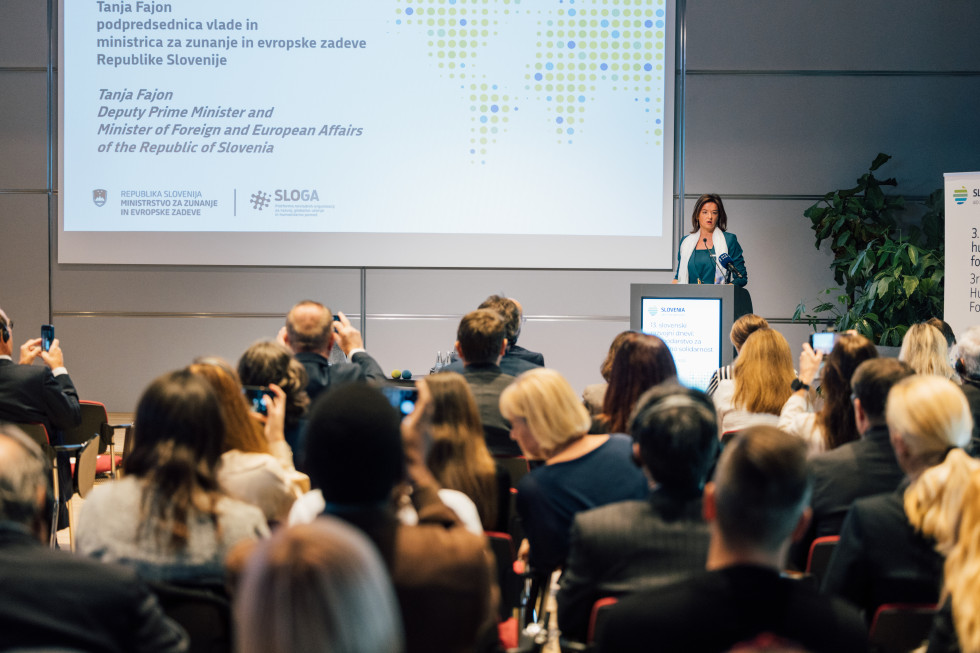Fajon at the 13th Slovenian Development Days: The economy is the Engine of Development and Solidarity its Foundation

Minister Tanja Fajon opened the 13th Slovenian Development Days | Author MZEZ
In her opening address, Minister of Foreign and European Affairs Tanja Fajon underlined that, amid rising geopolitical tensions and increased security spending, Slovenia remains committed to the fundamental principle that contributing to global prosperity is the best investment in peace and security. “This holds especially true for Slovenia, which places multilateralism, human rights, solidarity and respect for international and humanitarian law at the heart of its foreign policy,” the minister stressed. She added that such a policy must be adequately supported with financial resources and noted: “Responsibility for achieving the Sustainable Development Goals lies with all stakeholders — governments, the business sector, civil society, and each of us as individuals.”
The opening conference of the Slovenian Development Days focused on the role of business in ensuring sustainable funding and fostering innovation. Edvin Skrt, Director-General of the Directorate for Development Cooperation and Humanitarian Aid at the Ministry of Foreign and European Affairs, emphasised that engaging the business sector provides “an opportunity to spur innovation and shape solutions for the common good. Development cooperation offers a space where responsibility, entrepreneurship and solidarity converge to create new success stories – for businesses and for humanity as a whole.”
The programme continued with the second part of the 3rd Slovenian Humanitarian Forum (the first part took place within the Bled Strategic Forum), where speakers presented concrete examples of best practice in terms of cooperation between companies and international organisations. Marc Lassouaoui (UNRWA – United Nations Relief and Works Agency for Palestine Refugees in the Near East) provided an update on the most recent humanitarian situation and needs in Palestine and UNRWA’s efforts, while Josiane Yaguibou (UNFPA – United Nations Population Fund) and Tomaž Plešec (ElevonX) presented a joint project, whereby the Slovenian company ElevonX supplies the UNFPA in Madagascar with drones to deliver urgent medical supplies and medicines to remote parts of the island, primarily to assist mothers in the postpartum period.
The ensuing policy-level panel included a conversation with Matevž Frangež, State Secretary at the Ministry of the Economy, Tourism and Sport, and Neva Grašič, State Secretary at the Ministry of Foreign and European Affairs. Frangež underscored that involving companies in development cooperation strengthens their international presence, stimulates investment and builds resilience in partner countries. Grašič explained that official development assistance alone is not sufficient: “Engaging the private sector is essential to bridge the current development and humanitarian gap.”
The final high-level panel was opened by Uroš Vajgl, State Secretary at the Ministry of the Environment, Climate and Energy, whose keynote highlighted the nexus between the environment, society, peace, technology and entrepreneurship. Speakers agreed that partnerships between the private sector and development and humanitarian organisations are natural, necessary and mutually beneficial.
Citing examples of best practice, Ivana Mrdja (IFRC – International Federation of Red Cross and Red Crescent Societies) and Dr Martin Frick (WFP – World Food Programme) highlighted the Disaster Response Emergency Fund (DREF) and WFP’s school meals initiative, as well as the role of local economies in both the fund and the initiative. Prosper Sebagenzi (Caritas Rwanda) emphasised the importance of engaging local communities and presented their experience, while Josef Karl Pelikan (UNIDO – United Nations Industrial Development Organisation) and María del Pilar Garrido Gonzalo (OECD – Organisation for Economic Co-operation and Development) provided an overview of innovative approaches to financing development projects.
Participants agreed that events such as the Slovenian Development Days provide numerous opportunities for private-sector engagement in humanitarian and development initiatives and welcomed Slovenia’s efforts in this area.
On the margins of the event, Minister Fajon presented awards to Ella Ficko (Puconci Primary School) and Tita Žilavec (Kungota Primary School), the winners of Slovenian Caritas’ competition Together for a Better Tomorrow. In their artworks and written submissions, young creators reflected on the topics of solidarity, a better future and joint efforts for a fairer world.
The 13th Slovenian Development Days continue through Friday, 17 October, featuring numerous events, debates and meetings. The closing session will also take place at the Chamber of Commerce and Industry of Slovenia, with discussions and practical workshops focused on the next steps to strengthen partnerships between the business sector, the state, international organisations and other stakeholders.

